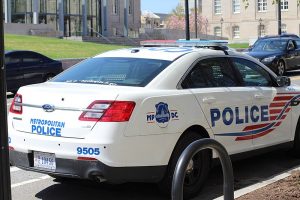Georgetown students are known for being politically-active. Throughout the years, Hoyas have mobilized around a variety of issues, ranging from the Vietnam War to South African Apartheid to LGBTQ+ rights.
Participating in political activism can be fulfilling and educational. However, students should be aware of their rights when engaging with the Georgetown University Police Department (GUPD), the primary entity responsible for campus security.
GUPD Jurisdiction
GUPD has jurisdiction over Georgetown’s main and medical campuses. Their officers respond to incidents of theft, violence, sexual assault, and violations of the Code of Student Conduct, which they pass on to the Office of Student Conduct. GUPD officers have full arrest powers on campus but are not armed with guns. Instead, they carry batons and pepper spray, as all firearms are prohibited on Georgetown’s campus according to the university’s weapons policy.
GUPD officers are commissioned by D.C.’s Metropolitan Police Department (MPD), giving them their arrest powers, and the two participate in joint training exercises to ensure smooth cooperation. GUPD states that it “works closely” with both MPD and the D.C. fire department to “prevent and deter crime on campus.”
Through the Reimbursable Detail Subsidy Program, the university must employ MPD officers to patrol off-campus Georgetown neighborhoods and respond to noise violations. MPD also independently responds to incidents in the area.
Issues that involve Georgetown students are handled by the Student Neighborhood Assistance Program (SNAP), run by Georgetown’s Office of Neighborhood Life. SNAP will send a vehicle to the residence concerned, document the incident and resolution, and submit a report to the Office of Student Conduct, which will follow up to determine if there have been any code of conduct violations.
GUPD has launched several initiatives to increase student security, including the Sexual Assault Response Team (SART)—specially trained police officers within GUPD who provide services including no-contact orders, guidance on how to obtain protection orders, and physical evidence recovery kits.
Additionally, GUPD manages the SafeRides program, which provides transportation for Georgetown students, faculty, and staff to and from any location within certain boundaries.
Past Controversies with GUPD
In the 2020 campus climate survey, Black and Latinx students reported being stopped by GUPD at disproportionate rates compared to their white peers. In response, GUPD began tracking the demographic information of field stops. GUPD officers now provide an information pamphlet to each individual stopped and record the person’s race, gender, campus affiliation, last name, and NetID as well as the time, location, and reason for the stop.
In April 2022, LaHannah Giles (CAS ’23) experienced a hate crime involving racial slurs and death threats shouted by a white student. Giles filed a police report and a bias report with the Office of Student Conduct. GUPD produced a report identifying the perpetrator based on security footage, but later told Giles they lost the video footage due to an unexpected server failure. The suspected perpetrator did not receive disciplinary action. Students responded with sit-in protests in Healy Hall from Dec. 4 to 9 of 2022, resuming in February 2023 when the university investigation was deemed “inconclusive” by the Institutional Diversity, Equity, and Affirmative Action office. Demonstrators demanded that GUPD take responsibility for the mismanagement of the investigation and that the university expel the perpetrator.
Interacting with GUPD
GUPD officers routinely patrol Red Square, which is designated as a free speech zone, and thus is where student groups often hold protests. In February 2024, demonstrators protested a Georgetown University Campus Ministry event that brought three soldiers from the Israel Defense Forces to campus. The protest included chants opposing police presence. Some groups, such as Students for Justice in Palestine (SJP), have specially-trained liaisons to engage with law enforcement, according to an SJP board member.
According to Georgetown’s Speech and Expression Policy, students have the right to protest events as long as the audience’s right to see and hear the speaker is not violated. Students may use social media and send emails, and in certain zones on campus, like Red Square, they can put up flyers and banners, chalk exterior walkways, and staff information tables.
“We respect the rights of members of our community to express their personal views and are committed to maintaining the values of academic freedom and serving as a forum for the free exchange of ideas, even when those ideas may be controversial and objectionable to some,” a Georgetown University spokesperson wrote in a statement to the Voice.
The spokesperson added that Georgetown may regulate the time, place, and/or manner of a demonstration to ensure that it does not disrupt the university’s ordinary activities.
“GUPD becomes involved either when there are matters affecting the immediate safety and security of the Georgetown community, or after they have coordinated with the Division of Student Affairs or other university offices,” the spokesperson wrote. “The vast majority of student activism on campus is peaceful and takes place without incident.”
A GUPD lieutenant will maintain liaison with groups planning demonstrations and may be present at the event. If stopped by a GUPD officer while participating in demonstrations, students have the right to know the reason for the stop. They also have the right to remain silent and to ask if they are free to leave. A pamphlet provided by GUPD says that students may be subjected to a pat-down search if the officer has a reasonable suspicion that the student is carrying a weapon. However, students may refuse the search of their person, belongings, or residence without a reasonable suspicion or a warrant.
In D.C., citizens have the right to record interactions with police officers, provided it does not interfere with the officer’s duties. If you disagree with the reason you were stopped, keep track of the officer’s name, their identification number, and the details of the potential misconduct and file a complaint.
Filing Complaints
Concerns related to free speech and expression should be reported to the Office of the Vice President for Student Affairs by emailing speechandexpression@georgetown.edu. Additionally, students may report concerns by meeting with the Student Safety Advisory Board, which shares relevant information from GUPD with community members and expresses community concerns to GUPD. Finally, GUPD provides a Complaints, Compliments and Feedback form that can be completed anonymously based on any interactions with officers.






